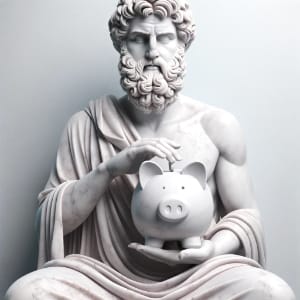Dive into the intersection of Stoicism and personal finance. Learn how ancient Greek teachings can offer a refreshing perspective on modern financial challenges, guiding you towards wiser decisions and a deeper understanding of wealth and expenditures.
Stoicism & Personal Finances: Ancient Wisdom for Modern Wallets
Stoicism, an ancient Greek philosophy, may seem distant from the contemporary challenges of personal finances. Yet, its principles of endurance, rationality, and control over one’s emotions can provide invaluable guidance in navigating the tumultuous waters of financial decisions. This article delves into how Stoic teachings can be applied to personal finances, offering a unique perspective on wealth, savings, and expenditures.
The Pillars of Stoicism and Their Relevance to Finance

1. Understanding What is Within Our Control
The Stoic philosophy teaches that we should focus only on what is within our control and accept what is not. In personal finances, this means recognizing the difference between external financial pressures (such as market fluctuations or economic downturns) and internal financial decisions (like spending habits and saving strategies).
- Application: Instead of stressing about global economic trends, focus on creating a budget, cutting unnecessary expenses, and building an emergency fund.
2. Pursuit of Virtue Over Wealth
Stoics believe that virtue, not material wealth, is the highest good. While money is necessary for survival and comfort, it should not be the primary pursuit of life.
- Application: Prioritize financial decisions that align with your values, such as ethical investing or supporting local businesses, rather than merely seeking the highest returns.
3. Embracing Challenges as Opportunities for Growth
Challenges, according to Stoicism, are not setbacks but opportunities to learn and grow. Financial difficulties, while stressful, can teach resilience, resourcefulness, and financial discipline.
- Application: When faced with a financial challenge, instead of despairing, view it as a chance to reevaluate your financial strategies and develop new skills, such as learning about investments or frugal living.

Stoic Strategies for Financial Well-being
1. Negative Visualization
Stoics practice imagining worst-case scenarios to prepare mentally and emotionally. By visualizing potential financial pitfalls, one can create strategies to mitigate risks and be better prepared for unexpected financial challenges.
2. Practicing Gratitude
Being grateful for what you have reduces the constant desire for more. This can lead to contentment with one’s financial situation and reduce impulsive spending.
3. Avoiding Hedonic Adaptation
Stoicism warns against the human tendency to quickly return to a stable level of happiness despite positive or negative changes in life. By being aware of this, one can avoid the trap of constantly seeking more material possessions to achieve happiness.
Real-life Examples of Stoicism in Personal Finance
1. Living Below Your Means
Many successful individuals, despite earning high incomes, choose to live frugally. This Stoic practice of not letting wealth dictate one’s lifestyle can lead to significant savings and financial freedom.
2. Investing in Experiences Over Possessions
Studies have shown that experiences bring more lasting happiness than material possessions. A Stoic approach to finances might prioritize saving for a memorable trip over buying the latest gadget.
3. Seeking Financial Education
Understanding that knowledge is power, Stoics would likely advocate for continual financial education. This can help individuals make informed decisions and avoid common financial pitfalls.
Conclusion
While Stoicism is an ancient philosophy, its principles remain relevant today, especially in the realm of personal finance. By understanding what is within our control, valuing virtue over wealth, and viewing challenges as growth opportunities, we can navigate our financial journey with wisdom and resilience. As we integrate these Stoic teachings into our financial lives, we not only ensure our monetary well-being but also cultivate a richer, more meaningful life.







